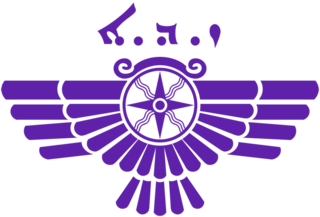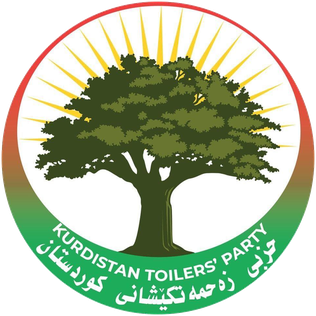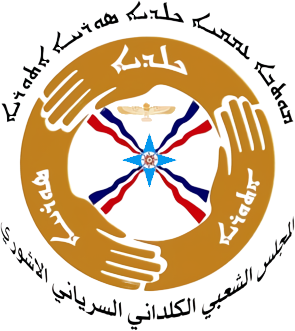Iraq is a federal parliamentary representative democratic republic. It is a multi-party system whereby the executive power is exercised by the Prime Minister of the Council of Ministers as the head of government, the President of Iraq as the head of state, and legislative power is vested in the Council of Representatives.

The National Iraqi Alliance, also known as the Watani List, is an Iraqi electoral coalition that contested the 2010 Iraqi legislative election. The Alliance is mainly composed of Shi'a Islamist parties. The alliance was created by the Supreme Council for Islamic Revolution in Iraq to contest in the January 2005 and December 2005 under the name United Iraqi Alliance, when it included all Iraq's major Shi'a parties. The United Iraqi Alliance won both those of elections however later fell apart after several major parties left the alliance due to disputes with Prime Minister Nouri al-Maliki and the Supreme Council.
The Democratic Patriotic Alliance of Kurdistan (DPAK) sometimes referred to simply as the Kurdistan Alliance (KA) is the name of the electoral coalition first presented as a united Kurdish list in the January 2005 election in Iraq. Elections were held simultaneously for the assembly of Kurdistan Region. The Alliance represents a coalition of the two main Kurdish parties, the Kurdistan Democratic Party and the Patriotic Union of Kurdistan

The Assyrian Democratic Movement, popularly known as Zowaa, is an Assyrian political party situated in Iraq, and one of the main Assyrian parties within the Iraqi parliament. The Assyrian Democratic Movement states its aims are to establish equal citizenship rights with the rest of the Iraqi people without discrimination on the basis of nationality, belief, religious affiliation, culture, language and other characteristics of the native Assyrians of Iraq, to acknowledge the past massacres committed against them and to ensure they are never repeated again.
Kurdistan Islamic Union, colloquially referred to as Yekgirtû, is a Kurdish Islamist party in Iraqi Kurdistan.

The Kurdistan Toilers' Party was founded in 1985 by Qadir Ezîz and Ebdulxaliq Zengene as a splinter of the short-lived alliance Kurdistan United Socialist Party (HSYK), which had included the Kurdistan Socialist Democratic Party, the Socialist Movement of Kurdistan and the two splinters of the South Kurdistan Movement. They had belonged to the left wing of the party and had criticized the leadership for abandoning socialism in favor of tribal democracy.

The Bet-Nahrain Democratic Party, usually abbreviated as BNDP is an Assyrian political party in Iraq led by Romeo Nissan Hakkari. One of the party's goals is to create an autonomous Assyrian Administrative Region within the Assyrian homeland.

The Kurdistan Regional Parliament, also known as Kurdistan Parliament - Iraq, or simply Perleman, is the parliament of the Kurdistan Region in Iraq. It is made up of representatives from the various parties, lists or slates that are elected every four years by the inhabitants of Kurdistan Region, which is currently governed by the Kurdistan Regional Government. In 2009 an amendment was applied to the Kurdistan Election Law of the year 1992, changing the name of the body to Kurdish Parliament from its previous name: the Kurdish National Assembly.
The Isthar Patriotic List is an Assyrian political list that was formed to run in the 2009 Iraqi governorate elections.

Assyrian politics in Iraq have been taking many different turns since the US invasion of the country in 2003. Today, there are many different Assyrian political parties in Iraq. The main Assyrian party that came out from the 2005 elections was the Assyrian Democratic Movement. However, Sarkis Aghajan began to challenge its power beginning in 2006 with the opening of Ishtar TV and the KDP-affiliated Chaldean Syriac Assyrian Popular Council.

The Kurdistan Region parliamentary elections of 2009 took place on 25 July 2009. A total of 2.5 million citizens of Kurdistan Region were eligible to vote for the parliamentary and presidential elections. People currently living outside Kurdistan Region were not allowed to vote. The elections followed the 2005 Kurdistan Region parliamentary election. The parliamentary elections coincided with the direct election of the President of Kurdistan. Unlike the parliamentary elections in 2005, the president of Kurdistan was to be chosen directly through popular votes. A referendum to approve the constitution of Kurdistan Region originally planned for the same day was put back to 1 August.

The Gorran Movement or just Gorran (Change) is a Kurdish political party in the Kurdistan Region of Iraq. The party is led by Dana Ahmed Majid, it was formerly under the leadership of Omar Said Ali, and was founded in 2009 by Nawshirwan Mustafa. Gorran is the sixth largest party in the Kurdistan Region, having lost almost all of its voters (95%) since its foundation, and is now no longer represented in the Iraqi parliament.

The Chaldean Syriac Assyrian Popular Council, popularly known as Motwa, is a political party in Iraq, that was founded in 2007, on the initiative of Sarkis Aghajan, a high-ranking member of the Kurdistan Democratic Party. As a party that represents minority communities, CSAPC participated in several elections, both on national, regional and local levels, mainly in various coalitions with other minority parties. The current president of the party is Jameel Zaito.

The Prime Minister of Kurdistan Region is the head of the Kurdistan Regional Government, governing semi-autonomous Kurdistan Region in northern Iraq. The government is elected as part of the Kurdistan Region Parliament.

Parliamentary elections were held in the Kurdistan Region of Iraq on 21 September 2013. They were the fourth parliamentary elections in Kurdistan Region since 1992. The candidates were competing for a total of 111 seats out of which 11 seats were reserved for minorities. According to the Iraqi High Electoral Commission, there were 366 female and 736 male candidates for the elections. A total of 2,653,743 people were eligible to vote throughout the three provinces of Erbil, Sulaymaniyah and Dohuk of which 74% cast their ballots.

Parliamentary elections took place in Kurdistan Region on 30 September 2018 to elect Parliament. The election came a year after a failed bid for independence and left the ruling Kurdistan Democratic Party (KDP) with 45 seats, that positioning it to lead the next regional government. Announcement of the results was delayed for three weeks. The KDP's historic rival and junior coalition partner in government, the Patriotic Union of Kurdistan (PUK), was in second place with 21 seats. The results suggest that Masoud Barzani’s KDP will take a dominant position in Kurdish politics.

The President of Kurdistan Region is the head of semi-autonomous Kurdistan Region in northern Iraq. They are part of the Kurdistan Presidency Council. The current President of Kurdistan Region is Nechirvan Barzani, who assumed office on 10 June 2019.

The first Rojava regional elections were held on 1 December 2017. Local councils for the Jazira Region, Euphrates Region and Afrin Region were elected as well as for the subordinate cantons, areas and districts of the regions of Rojava. This followed the communal elections that were held on 22 September and was to be followed by a federal parliamentary election of the Syrian Democratic Council, the region's highest governing body, initially scheduled for January 2018, but was later postponed.

The 2018 Assyrian elections in Iraq were the first elections since the Islamic State invasion of Iraq, including the Assyrian heartland, the Nineveh Plains in August 2014. A parliamentary election will be held in Iraq on 12 May 2018. Of the 329 seats in the Iraqi parliament, 5 are reserved for the Christian minorities. The five reserved seats are separated one for each governorate of: Baghdad, Duhok, Erbil, Kirkuk and Nineveh. At the time of voting, only about 200,000 Assyrians remained in the country.

The Athra Alliance is a political alliance of five political parties in Iraq that represent the Assyrian people. The alliance comprises these five parties:
















